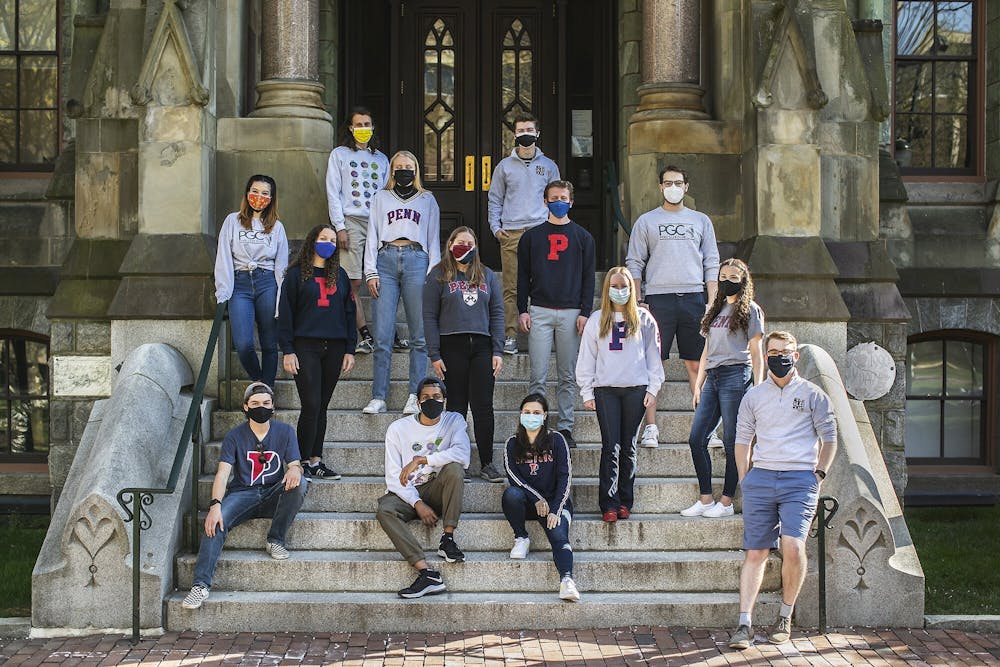57,864: the number of days between November 5, 1862 and April 9, 2021.
On November 5, 1862, the Penn Glee Club was founded as Penn’s first performing arts group. A whopping 57,864 days later, the Glee Club and the Penn Sirens agreed to merge our two groups, finally making PGC a fully gender-inclusive organization.
Agreeing to this merger and removing gender-based restrictions on the Glee Club’s Singers section required a long, thorough, and often challenging process. Many different stakeholders – members, alumni, other Performing Arts Council groups, and more – had feedback, suggestions, and questions about our Initiative for a Gender-Inclusive Choir. For nearly a year, we thought deeply about what we value about our performing arts experience and aimed to strike a balance between preserving our rich traditions and fostering a more diverse and inclusive future.
The starkly different histories of our two groups and the possibility of merging presented us with an opportunity to reevaluate the structures of the Glee Club and the performing arts community. Penn Sirens was founded in 2011 to provide woman-identifying students the same opportunities for performance, artistic expression, and musical community already afforded to male-identifying singers by PGC. However, the Glee Club’s established history, network, and reputation at Penn and around the world rendered Sirens unable to compete with PGC’s resources and opportunities. We felt that this inequity needed to be resolved, and as PGC members pushed for gender inclusivity within our group, a merger with Sirens became the most desirable outcome. But pursuing this change after 159 years of a male-only Singers section wasn’t simple. The very concept of gender inclusivity in the Singers section — to accompany the already gender-inclusive Band, Tech, and Accompanist sections of the Club — inflamed the passions of the PGC community and demonstrated to us just how important careful consideration of the IGIC was.
During this process, we hosted calls and sent surveys to every alumni of both groups to give those interested a voice. We received feedback arguing that losing the all-male choir and the tenor-bass sound that came with it would strip the Glee Club of its most renowned characteristic as a group. Sacrificing our distinguishing feature was seen as potentially limiting the prestige and relevance of PGC. Additionally, some contended that it isn’t the Glee Club’s responsibility to address issues of diversity, equity, and inclusion.
A second sizable contingent of alumni said that the current members should be free to craft the experience we desire. Finally, many alumni, all the way back to the Class of 1955, proclaimed their wholehearted support of a gender-inclusive choir.
We carefully considered all of these different viewpoints and the pros and cons of several potential outcomes. One point that kept coming up throughout the process was the Club’s self-proclaimed title of unofficial “musical ambassador” of the University. The Glee Club was the first Penn group to wear red and blue as part of our uniforms, and we have the honor of bookending the Penn experience at each year’s Convocation and Commencement ceremonies. However, in recent years, members of the Club began to question the accuracy of our “musical ambassador” claim. Could we truly be an ambassador for the University when such a significant portion of the student body was excluded from singing with us? Our unanimous vote in favor of merging and moving to a gender-inclusive choir answered that question with a resounding “no.”
Merging and opening our auditions to singers of all genders and voice parts moves us closer to truly being Penn’s unofficial musical ambassador. We believe this move will allow us to add new musical capabilities and establish new traditions without diminishing Glee Clubbers’ favorite musical and social experiences from before the merger.
Crucially, the work of creating a more equitable Glee Club and Penn performing arts community does not and cannot stop here. The newly merged Glee Club will continue to make diversity, equity, and inclusion a priority and a key focus. This year was PGC’s first with Diversity and Inclusion Chairs, and as that role continues to develop, its already impressive impact will be felt in more aspects of the Club experience.
After 159 years with an all-male, tenor and bass PGC Singers section, it’s surreal to see this merger become a reality. We hope that future generations of Penn performing artists will feel empowered to continue working toward positive change and striving to create the most inclusive and equitable communities possible for those of all backgrounds and upbringings.
The first performance of the newly-merged Penn Glee Club took place at Penn’s Baccalaureate ceremony on May 16, and COVID permitting, we will begin performing together in person at Convocation 2021. The work of making the Glee Club the most inclusive and welcoming organization possible is far from over, and we could not be more excited to embark on the journey of building the best version of the Penn Glee Club together.
MARINA DAUER is a College junior studying Political Science and Environmental Studies. She is also the President of Penn Sirens. Her email is mdauer@sas.upenn.edu.
JAKE MILNER is a Wharton senior studying Finance and Accounting. He is also the President of the Penn Glee Club. His email is jmilner@wharton.upenn.edu.
LYNN AHRENS is an Engineering junior studying Materials Science & Engineering. She is also the Publicity Manager and incoming President of the Penn Glee Club. Her email is lahrens@seas.upenn.edu.









